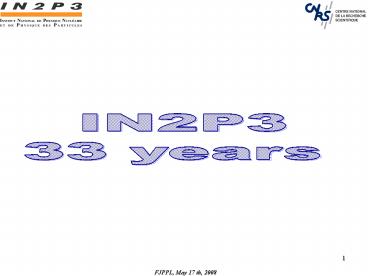Pr - PowerPoint PPT Presentation
Title: Pr
1
IN2P3 33 years
2
14 000 Researchers12 000 Engineers, Technicians,
Administrative in 1300 lab
CNRS
ST2I
MPPU
IN2P3
INSU
SPM
STIC
SPI
SC
SDV
SHS
Universe
Nuclear Particle
Physics Maths
Bio.
Computing
Engineer
Chemistry
Humanities
Personnel 1931 2671 2833
1317 1409 3496
5748 3969 Budget 2,2 G
3
CNRS
CNRS Priorities
- Life Sciences
- Computer sciences
- Nanotechnologies
- Environment
- Interdisciplinarity
A new strategic plan in preparation
- But also new environment for research in France
(as in UK, Italy,) - New agencies ANR, A2I
- New campus-like structures RTRA, PRES
- New status for universities
- New network like structures Carnot Institutes
4
18 laboratories 800 recherchers (CNRS
Universities) 1600 ITA/IATOS 60 projects
IN2P3 conducts pp and np for the entire french
academic world (except CEA)
Basic Rechearch Nuclear Physics Particle
Physics Astroparticle Physics
Interdisciplinary applications Nuclear
Energy Biomedical Condensed matter ...
Instrumentation Detectors, Accelerators, Computin
g
Theory
5
IN2P3
Particle Physics Computing Nuclear
Physics Astroparticle Physics
Nuclear Energy Applications
Accelerators
6
IN2P3/CNRS 20 labs
Uni.
CNRS
CNRS
Uni.
7
International Collaborations
Bilateral agreements with Spain, Tchec.
Republic, Poland, Romania, GSI, Dubna Nikhef,
US, Japan, China, Corea Regular meetings with
DOE, KEK, INFN, PPARC, EPSRC, BMBF,
NIKHEF Collaborations with many other countries
NuPECC, APPEC
8
PARTICLE PHYSICS
9
Particle Physics at IN2P3 200 Physicists/10
Laboratories
Ongoing Experiments BaBar
(30/4) D0
(30/7) H1
(15/3) Near Future Experiments ATLAS
(60/6) CMS
(30/4) LHCb (20/4) LCG
Far Future
Experiments ILC
(15/5) CLIC (4/2)
Date of completion 2009 2008 2007 Date of
readiness 2008 2008 2008 2009 2025 ?
10
Research Aims
Ongoing Experiments BaBar SLAC
US D0 FNAL US H1
DESY D Near Future Experiments LHC
CERN ATLAS CERN CMS
CERN LHCb
CERN LCG
ccin2p3 Far Future Experiments ILC, CLIC WHERE?
Preparation to LHC Physics Higgs and new
Physics CP Violation Proton Structure Tier 1 and
2 for LHC RD for ILC and CLIC
11
NUCLEAR PHYSICS
12
NUCLEAR PHYSICS 290 permanent scientists 221
physicists (experimentalists), 46 theorists, 23
radiochemists, 10 laboratories
ALICE, RHIC
TJLAB (G0, DVCS) GSI (HADES)
GANIL, Orsay (ALTO), GSI,LEGNARO, JYVASKYLA,
ISOLDE, DUBNA
13
Nature of the confinement of quarks and gluons
ALICE (CERN)
IN2P3 5 laboratories - Dimuon arm
- Internal tracking system (ITS) Investment
6.6 M
Hadronic physics
HADES
Understand the structure of nucleons and light
nuclei Confinement of quarks et gluons in
hadrons Strong interaction (QCD) Structure
modifications of hadrons in nuclear matter TJNAF,
GSI
14
Structure and the dynamics of nuclei. Nature of
the nucleonic matter
Some key facts New limits of stability (37Ne)
Discovery of 48Ni 2p radioactivity New
deformations, New magicity Nuclear molecules New
detectors (EXOGAM, VAMOS)
GANIL
- Origin of nuclear binding - Limits of nuclear
stability - Heavy and super-heavy elements -
Formation of elements in the universe
(nucléosynthesis)
SPIRAL CAEN
RD for SPIRAL2 ALTO (agreementDUBNA-IPNO) RD
future detectors AGATA
- KEEP THE INTERNATIONAL COMPETITIVITY OF GANIL
- SPIRAL2 project
- - 2002-2008 experiments with SPIRAL I
- SPIRAL II , a priority stated by NuPECC 118M
(full cost) - cofinanced by Region (33) - Decision expected end-2004- into operation
2009 - Complementarity with GSI - Future with EURISOL
15
SPIRAL II project
Driver SC Linac 40MeV, 5mA d et 14.5 AMeV, 1pmA
heavy-ions
gt1013 fissions/sec.
d-gtn 12C converter 238UCx target
- Multi-beams (up to 5)
- Into operation 2009
Post-acceleration in CIME Energy lt 6 AMeV
16
Pluridisciplinary Program PACE Back-end of
electronuclear cycle
IN2P3 focused on transmutation of nuclear wastes
and innovative systems for the future of
nuclear Energy - Experimental validation of
Accelerator Driven Systems (ADS) RD European
programs (MEGAPIE, n-TOF, MUSE, PDS-XADS,
EUROTRANS) - High intensity accelerator
developments (IPHI)
Innovative systems for Nuclear Energy based on
the Th cycle Scenarios, focused on the
concept of a molten salt reactor
17
ASTROPARTICLE PHYSICS
18
Current IN2P3 program On Astroparticle, Cosmology
and Neutrino
19
ASTROPARTICLE PHYSICS NEUTRINO 200 researchers,
154 engineers, 70 non permanent staff
Space programs 25
20
A cosmic ray program
HESS, Namibia, 2004
AUGER, Argentina, 2005
VIRGO, Pisa, 2006
ANTARES, Toulon, 2006
High energy gamma, ultra high energy cosmic rays,
gravitational waves, neutrinos
21
In the near futureCosmic rays and cosmology in
space
High energy gamma rays, antimatter, CMB, Dark
Energy
GLAST, 2007
AMS 2009
PLANCK, 2008
SNAP/JDEM 2015
LISA 2015
SNIFS, SNLS
22
LSM in Fréjus
- NEMO3, double beta decay (2003-)
- EDELWEISS II, dark matter (2006)
- Low radioactivity studies (ILIAS)
- Search for SHE in nature
23
Neutrino roadmap
- OPERA(2006)
- In the next few years
- DOUBLECHOOZ (2008-2009)
- T2K (2009-2013)
- RD for SuperNEMO, double beta decay (gt2010)
- At the horizon of 2015-18
- Megatonne detector in Fréjus in relation to super
and beta beam from CERN?
24
- Sources
- AP
- TGE HESS
- Prgm Astrop
25
Astroparticle missions
See talk by AM Ferrer and L. Mallet for Human
Ressources
26
Conclusions
- The research environment in France is changing
fast. - It abandons the model of unique desk agencies
providing autonomously all resources, hiring
people, and managing their careers to grant
providing agencies - The IN2P3 concentrating on a project by project
management structure hopes to keep its potential
of large project funding, the concomitant
pluri-annual character of engagements and the
autonomy of its strategic thinking (in
coordination with the other agencies in France,
Europe and the world) - .































